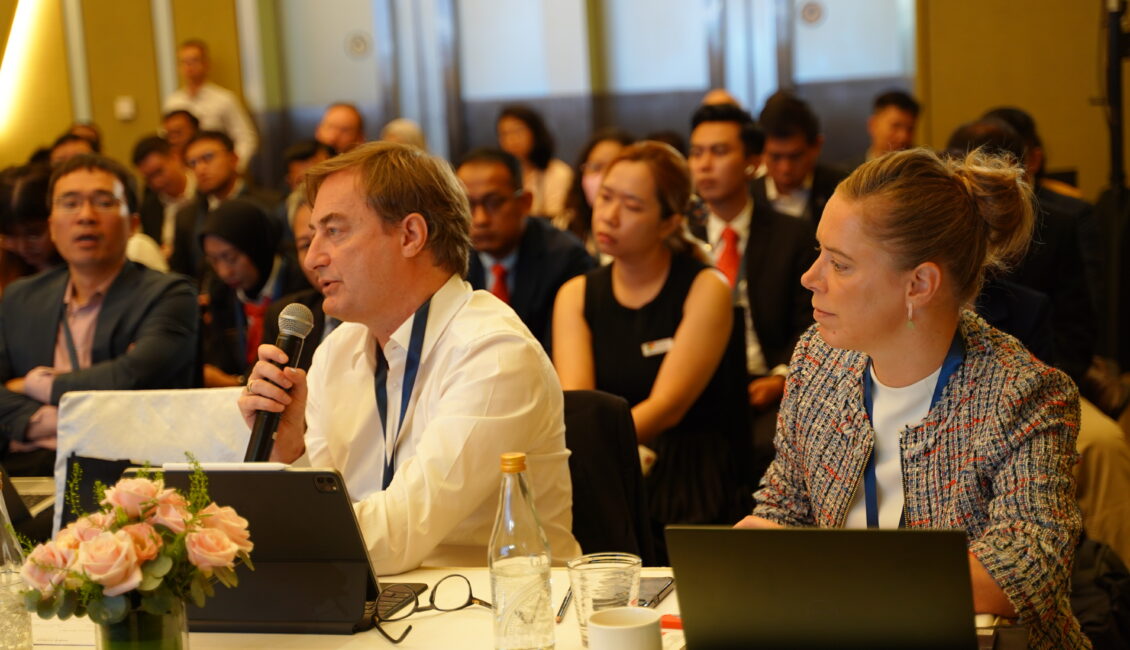
The Global CSR & ESG Summit and Awards 2024™
- April 25, 2024 08:00Registration and Exhibition Viewing
- April 25, 2024 08:45Chairperson Opening Remarks
- April 25, 2024 08:55Keynote Address: How Corporates Can Leverage Their Employee Talent, Business Models, And Assets To Create Deep Impact That Drives Transformational Change
- April 25, 2024 09:15ESG: Navigating Governance, Strategy, and Risk Management
- April 25, 2024 09:35Delivering superior returns from ESG innovation and sales
- April 25, 2024 09:55Panel Discussion: Opportunity and Risk: Linking ESG To Strategy for the Creation and Preservation of Sustainable Long-Term ValueSpeakers:
 Vu Tra MySustainability Manager, Home Credit Vietnam
Vu Tra MySustainability Manager, Home Credit Vietnam Rahul GuptaSenior Expert, McKinsey & Company
Rahul GuptaSenior Expert, McKinsey & Company Andika Dwi SaputraHead of ESG & Sustainability , Evermos
Andika Dwi SaputraHead of ESG & Sustainability , Evermos Ts. Mahmood LongSenior Manager, Community Relations & Consultation, Sarawak Energy
Ts. Mahmood LongSenior Manager, Community Relations & Consultation, Sarawak Energy Prof. Dr Geoffrey WilliamsFounder and Director, Williams Business Consultancy Sdn Bhd
Prof. Dr Geoffrey WilliamsFounder and Director, Williams Business Consultancy Sdn Bhd
- April 25, 2024 10:40Morning Networking Refreshment & Exhibition Viewing
- April 25, 2024 10:55Panel Discussion: Sustainable Investment: The Role of Financing in Facilitating Sustainable Business Transformation
- April 25, 2024 11:40Enhancing Healthcare Accessibility and Sustainability: Vinmec Healthcare System's 11:40 AM Dedication to CSR & ESG Principles
- April 25, 2024 12:00Networking Luncheon and Exhibition Viewing
- April 25, 2024 13:00ESG Ratings and Transparency: Advancing Sustainable Finance
- April 25, 2024 13:20Panel Discussion: Efficient ESG Governance: Transforming Commitments into Measurable ActionsSpeakers:
 Mai Thi Thanh HuongPublic Affairs Head, Consumer Healthcare, Sanofi
Mai Thi Thanh HuongPublic Affairs Head, Consumer Healthcare, Sanofi David JacksonPrincipal and Chief Executive Officer | Vietnam and Cambodia, Avison Young
David JacksonPrincipal and Chief Executive Officer | Vietnam and Cambodia, Avison Young Pham Hai AuDirector Risk Assurance Services, PWC Vietnam
Pham Hai AuDirector Risk Assurance Services, PWC Vietnam Jérémie PioletSustainability Leader, Decathlon Vietnam
Jérémie PioletSustainability Leader, Decathlon Vietnam Arif MujahidinCorporate Communications Director, Danone Indonesia
Arif MujahidinCorporate Communications Director, Danone Indonesia Aru DavidDirector of ASSIST in the Mekong region covering Vietnam, Cambodia and Thailand.
Aru DavidDirector of ASSIST in the Mekong region covering Vietnam, Cambodia and Thailand.
- April 25, 2024 14:05Waste Processing as a New Renewable Energy Source for the Community
- April 25, 2024 14:25Unlocking Sustainable Growth through Circular Economy Strategies
- April 25, 2024 14:45Afternoon Networking Refreshments And Exhibition Viewing
- April 25, 2024 15:00Optimizing Sustainability: A Deep Dive into DECATHLON's Journey to Reduce Carbon Footprint in its Supply Chain
- April 25, 2024 15:20Panel Discussion: Elevating Governance from Good to Exceptional: Advocating for Diverse Talent through Actions, Not Just WordsSpeakers:
 Victor DulaitExecutive Director, Belgian-Luxembourg Chamber of Commerce in Viet Nam (BeluxCham)
Victor DulaitExecutive Director, Belgian-Luxembourg Chamber of Commerce in Viet Nam (BeluxCham) Florian Johannes BeranekVice Chairman, Central and Eastern European Chamber of Commerce in Vietnam
Florian Johannes BeranekVice Chairman, Central and Eastern European Chamber of Commerce in Vietnam Dr Ir. William L NoltenBusiness Development Director, ReXil Asia
Dr Ir. William L NoltenBusiness Development Director, ReXil Asia Nusheen NalwalaHead of CSR, Engagement with Purpose,Employee Wellbeing, Diversity, Equity & Inclusion,Tata Consultancy
Nusheen NalwalaHead of CSR, Engagement with Purpose,Employee Wellbeing, Diversity, Equity & Inclusion,Tata Consultancy Dr Stefan PhangGlobal Director, Sustainability & Creating Shared Value, Solenis
Dr Stefan PhangGlobal Director, Sustainability & Creating Shared Value, Solenis
- April 25, 2024 15:50Sustainable Food Practices: Essential ESG Factors for the Food & Beverages Industry, Highlighting the Success of Prepackaged Cuisine with Data-driven Approaches
- April 25, 2024 16:10The Role of Digital Transformation in Implementing ESG Goals – Dual Transformation Model for Manufacturing Industry
- April 25, 2024 16:25A Final Thought By The Chairperson
- April 25, 2024 16:30Guest Of Honour Speech and Commencement of Global CSR & ESG Awards
- April 25, 2024 18:00End of Event













